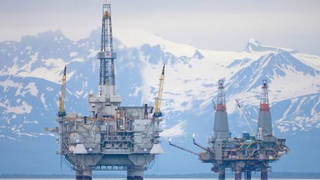
The Port of Seattle has voted to seek the blockade of rigs used by the oil giant Shell for its planned drilling in the Arctic this summer. Shell has signed a lease to station its rigs in the Puget Sound while it drills for oil in pristine and highly remote waters in the Chukchi Sea off the coast of Alaska. The Port of Seattle’s board called for a legal review of Shell’s plans and a temporary postponement of its docking. The move came after a wave of activism in Seattle challenging Shell’s effort. On Tuesday, activists set up a tripod to block work at the site of a fuel transfer station. Meanwhile, thousands of kayakers will try to block the arrival of a Shell rig on Saturday, the start of a three-day Festival of Resistance.
Transcript
AMY GOODMAN: On Tuesday, the Port of Seattle voted to seek the blockade of rigs used by the oil giant Shell for its planned drilling in the Arctic. Shell signed a lease to station its rigs in the Puget Sound while it drills for oil in pristine and highly remote waters in the Chukchi Sea off the coast of Alaska. The Port of Seattle’s board called for a legal review of Shell’s plans and a temporary postponement of its docking. The move came after a wave of activism in Seattle challenging Shell’s effort.
NERMEEN SHAIKH: On Tuesday, activists set up a tripod to block work at the site of a fuel transfer station. Meanwhile, thousands of kayakers will try to block the arrival of the rig on Saturday, the start of a three-day Festival of Resistance. Organizers are calling the flotilla the “Paddle in Seattle.”
For more, we’re joined in Seattle by Zarna Joshi, an organizer with the sHell No! Action Coalition. She’s also a volunteer with Rising Tide Seattle.
Zarna, welcome to Democracy Now! Could you talk about the action that you’ve planned?
ZARNA JOSHI: So, we’re going to have three days that we’re calling the Festival of Resistance. The first day is Saturday, May 16th. That’s the flotilla. And we will have many, many kayaks, canoes, barges on the water, and we will be sharing a massive show of numbers of people power on the water, showing that we can and we will stop Shell from going up to the Arctic. The second day, Sunday, is going to be a family day, a potluck in the park. And then Monday, May 18th, is going to be the day of mass direct action, when we take land—land-based actions in order to show Shell that we can shut them down on the water and on the land. They cannot hide.
NERMEEN SHAIKH: And, Zarna, there was also an earlier Greenpeace action against the rig. Could you tell us about that?
ZARNA JOSHI: Yeah, I believe it was six Greenpeace activists, and they boarded the rig as it crossed the Pacific Ocean, while it was actually moving. So, it was an incredible feat of bravery and skill. And they did it to highlight what Shell is doing and this just diabolical plan that Shell has to actually go and drill into the Arctic, from which we could never survive, because we know that the Arctic is what—is our air-conditioning system. And so, what the Greenpeace activists were doing was that they were shining a spotlight on what Shell is doing, so that the rest of the world can actually understand what is happening right here, right now, and that they were heading right toward Seattle at the time, so it really galvanized so much of the movement right here in Seattle.
AMY GOODMAN: Finally—we have 20 seconds—the Port of Seattle decision voting to seek the blockade of rigs used by the oil giant Shell for its planned drilling Arctic—in the Arctic this summer, your response to that?
ZARNA JOSHI: So, the Port of Seattle wants to pretend that it’s listening to the people, but actually the Port of Seattle is completely corrupt, and they are bought and paid for by Shell, by Foss, and they are not listening to the people. They have had thousands of calls, thousands of emails. We have showed up en masse to meeting after meeting after meeting, and they are ignoring the will of the people. And they are supposed to be our democratic leaders, and they’re refusing to listen to us. And that is why we are taking action May 16th to 18th in order to protest this corrupt system, this greedy capitalist system, that is utterly failing the people.
AMY GOODMAN: Zarna Joshi, we want to thank you for being with us, part of the sHell No! Action Coalition and volunteer with Rising Tide Seattle. And Subhankar Banerjee, renowned photographer, writer and activist, spent 15 years working for the conservation of the Arctic. That does it for this segment, but we’re going to go from Seattle down to the Gulf of Mexico. Stay with us.













Media Options